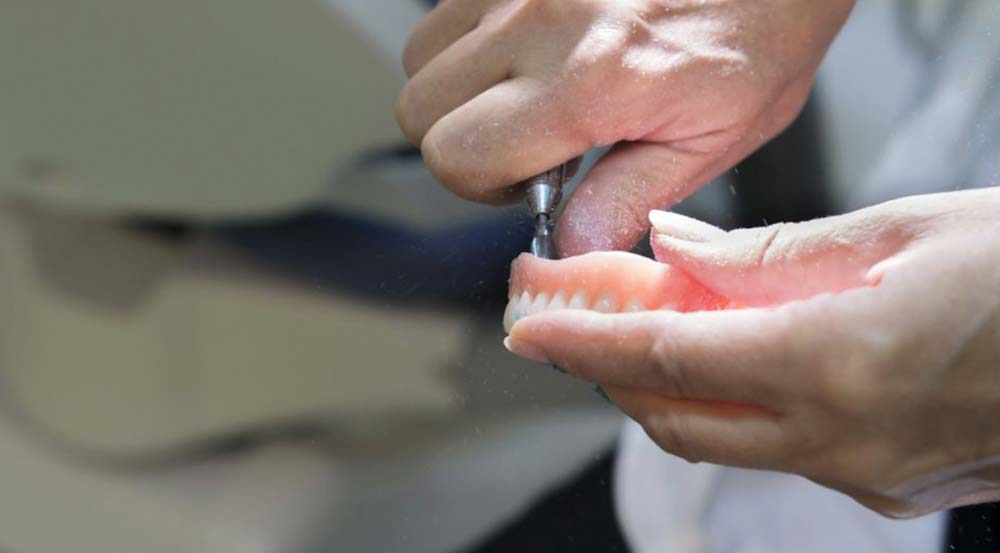
First Denture Reline and Repair: What to Expect
Although dentures are an incredibly durable substitute for natural teeth, they still require routine care and maintenance. Throughout the life of your dentures, you will probably need an occasional denture repair or denture reline in order to keep your dentures looking and functioning their best. So, what’s involved in repairing and relining dentures? How do you know when you need one of these services? And, what will happen during your appointment with the denturist?
What Is a Denture Repair and Denture Reline?
A denture repair and a denture reline are two different procedures that serve two separate purposes. Both of these procedures are integral when it comes to keeping your dentures performing optimally.
Denture Repair
A denture repair fixes any existing damage to your dentures. Whether your dentures have a chip, one of the teeth has fallen out, or you’ve noticed a crack in the acrylic, a denture repair addresses these issues. Normal wear and tear puts stress on dentures, allowing micro-fractures to occur that can eventually develop into visible defects. It is not unusual to need a denture repair even if you take impeccable care of your dentures on a daily basis.
Denture Reline
A denture reline is a procedure that refits the inside surface that rests against your gums and helps to create intimate contact between the denture base and the tissues inside your mouth. Oral soft tissue is in constant transition and changes shape with time. Depending on how rapidly your tissues change, you may need to have this procedure performed once every 1-2 years in order to keep your dentures fitting well and performing properly.
What Are the Benefits of Relining Dentures?
A reline can extend the useful life of your denture and improve its fit, making it feel more secure and comfortable, relieve rubbing or sore spots, and reduce or eliminate the need for denture adhesives. Despite these benefits, a denture reline is not a cure-all and may or may not be the solution for your specific situation. Dentures that are excessively old, heavily worn, in poor general condition, or really don’t resemble the current shape of your mouth should be replaced with new dentures. Read on to discover how to determine if a reline has the potential to benefit you.
How Do I Know If I Need a Denture Repair or Denture Reline?
If you notice changes in the condition of your denture or with your comfort, speech, or your denture’s performance, it’s best to talk with your denture care provider about whether it is appropriate to reline dentures or if a repair to your denture could help.
Some common symptoms that indicate a need for denture repair or denture reline are:
- Dentures that no longer fit as well as they once did
- Slipping dentures
- Slurred or whistling speech
- Difficulty eating foods that you were able to eat previously with no problem
- Visible cracks or damage to the denture
- Darkened areas that catch debris
- Stains that can’t be removed with routine cleaning
- Chronic sore spots inside the mouth
- General discomfort wearing your dentures
What Happens During a Denture Repair and Denture Reline?
The denture reline procedure appointment involves the following steps:
- A full examination of your mouth
- The provider will also assess the condition of your dentures
- Make recommendations to address any oral health conditions that were observed
- Discuss whether a denture repair or denture reline is the appropriate course of action
- Discuss the exact procedure, its cost, and how long you will be without your dentures
- Take impressions or other necessary records for the dental laboratory, as appropriate
Types of Denture Relining
How to reline dentures involves adding new material to the inside of the denture surface, filling in the gaps where the denture no longer fits flush against your tissue. Relines fall into two basic categories based upon the type of material used to perform the procedure.
Denture Hard Reline
Hard reline material is made from the same components that the denture was originally made from. Performing a denture hard reline procedure helps the denture fit “like new” while allowing you to brush and care for it just as you did with the original denture.
Denture Soft Reline
The soft reline denture technique achieves the same goals as the hard denture reline procedure while adding the additional benefit of a cushioning effect that may offer greater comfort to patients who have extremely resorbed or sore ridges. Because the reline material used is flexible, it requires special care in order to maintain its soft, pliable nature. Often dentures that have been soft relined cannot be soaked in commercial effervescent cleaning solutions. Doing so will change the consistency of the reline material, reducing the benefits offered by its spongy texture. Soft relines usually have a shorter lifespan compared to hard relines and must be replaced more frequently. Your dental professional will advise you of the type of reline that is best for you.
Wearing a Denture That Fits Less Than Ideally?
Relines and repairs can add life and additional comfort to your existing dentures. Schedule a consultation with one of European Denture Center’s caring denturists to see if denture repair or denture reline is a viable solution to your denture dilemma. Often, we can improve the fit and the condition of your existing denture in as little as one day.
European Denture Center also provides high-quality, affordable, personalized, comfortable dentures and partials. Our dentures and implants are customized to match your unique needs and your budget. Schedule online or give us a call at 866.428.0505 to arrange your free consultation with the office nearest to you.


